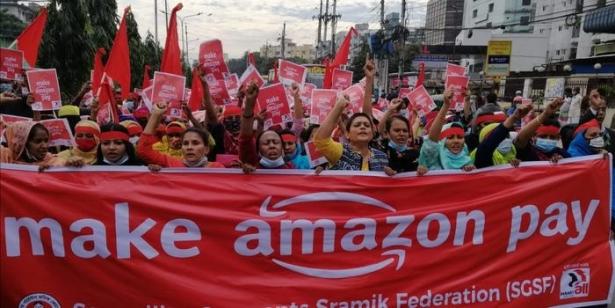On Friday, Amazon warehouse workers and social and environmental justice activists around the world will stage a series of coordinated protests, strikes, and actions to demand the online retailer respect workers' rights to participate in union activity, stop circumventing tax laws, and commit to higher environmental standards, according to the event's organizers.
The day of action, which is being called #MakeAmazonPay, coincides with Black Friday, one of Amazon's biggest sales events of the year and the start of its peak season, when warehouse worker injuries are highest and workloads for warehouse workers and delivery drivers skyrocket. On Friday, protest actions will take place across Amazon's supply chain in Brazil, Mexico, the United States, the United Kingdom, Spain, France, Belgium, Germany, Luxembourg, Italy, Poland, India, Bangladesh, the Philippines, and Australia.
As many as 3,000 workers will strike at six Amazon facilities in Germany. Garment workers in Bangladesh who manufacture clothes sold by Amazon will also protest. Trade union members and environmental groups, including the climate-focused Extinction Rebellion, will demonstrate outside Amazon's European headquarters in Luxembourg. In the Philippines, contracted Amazon Ring call center workers, who face 'subhuman' conditions according to a recent Financial Times article, will hold a virtual action. At Amazon's Seattle and Northern Virginia headquarters, community activists from social justice organizations, including Justice for Muslims Collective and La ColectiVA, will hold their own protests.
“During the Covid-19 pandemic, Amazon became a trillion dollar corporation, with Bezos becoming the first person in history to amass $200 billion in personal wealth," #MakeAmazonPay's statement signed by 39 organizations and sent to Amazon reads. "Meanwhile, Amazon warehouse workers risked their lives as essential workers, and only briefly received an increase in pay."
"Like all major corporations, Amazon’s success would be impossible without the public institutions that citizens built together over generations," the statement continues. "But instead of giving back to the societies that helped it grow, the corporation starves them of tax revenue through its world beating efforts at tax dodging."
The actions coalesce around a common set of demands put forward by more than 50 social justice organizations on both sides of the Atlantic, including UNI Global Union, Greenpeace, the Athena Coalition, the Sunrise Movement, OxFam, Our Revolution, Amazon Employees for Climate Justice, Progressive International, Public Citizen, and the Tax Justice Network.
“This is a series of misleading assertions by misinformed or self-interested groups who are using Amazon’s profile to further their individual causes,” Conor Sweeney, a spokesperson for Amazon’s Luxembourg headquarters said. “Amazon has a strong track record of supporting our people, our customers, and our communities, including providing safe working conditions and leading $15 minimum wage and great benefits, leading on climate change with the Climate Pledge commitment to be net zero carbon by 2040, and paying more than $5 billion in taxes globally.”
These demands include, but are not limited to, raising workers’ wages in all Amazon warehouses including premium pay during peak periods and hazard pay during the pandemic; reinstating all workers who have been fired after speaking up about workplace health and safety; giving unions access to Amazon worksites to speak to workers; committing to zero emissions by 2030; ending the sale of devices that rely on mass surveillance practices, such as Amazon Ring; and paying taxes in full where economic activity occurs.
"You might ask why we're targeting Amazon when our concerns exist at lots of other companies, and the answer is two fold," said Alex Cobham, chief executive of the Tax Justice Network, a signatory of the list of common demands, and a U.K. research network focused on financial regulation. "First, Amazon is on many issues the most extreme example. It’s the most extreme example of monopoly power and in numerous questions related to labor rights threats. The second part is that Amazon has done exceptionally well this year. If anyone has had a good pandemic, it’s Amazon. While everyone has been cursed by COVID, Amazon has done well but not because of its own merits. It’s done well because of the unprecedented state interventions to protect local health. Small businesses have been forced to close."
"One of the things that should happen is an excess tax to put most of this money back into the public system to contribute to public health costs," he continued. "If we allow Amazon to keep all these excess profits, it will only strengthen its monopoly position."
The day of global action comes on the heels of a report published by Motherboard revealing Amazon's obsessive surveillance of workers, labor unions, and environmental and social movements, particularly between Black Friday and Christmas. Internal documents revealed that Amazon closely tracks the number of warehouse workers participating in union activity, tracks environmentalist groups including Greenpeace and Greta Thunberg's Fridays for Future on social media, and even hired the Pinkerton Detective Agency—known for union-busting—to spy on warehouse workers.


Spread the word